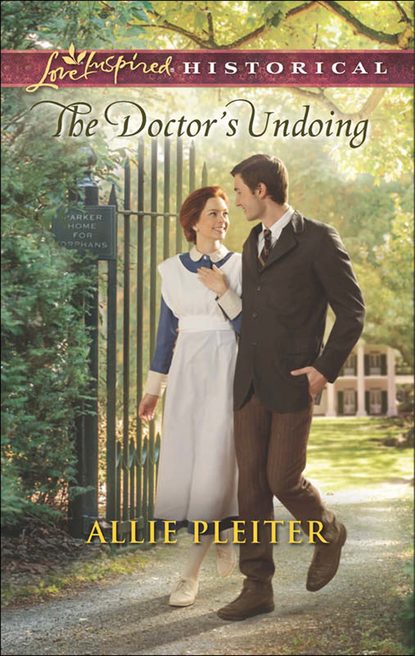По всем вопросам обращайтесь на: info@litportal.ru
(©) 2003-2024.
✖
The Doctor's Undoing
Настройки чтения
Размер шрифта
Высота строк
Поля
Chapter Twenty-Four (#litres_trial_promo)
Chapter Twenty-Five (#litres_trial_promo)
Epilogue (#litres_trial_promo)
Dear Reader (#litres_trial_promo)
Extract (#litres_trial_promo)
Copyright (#litres_trial_promo)
Chapter One (#ulink_e7d6984a-e100-5642-b814-f31306f61587)
July 1919 Charleston, South Carolina
Brr. Cold.
For July in Charleston, South Carolina, that was quite a feat. The shiver that ran down Ida Lee Landway’s back had nothing to do with the afternoon’s heat—which was oppressive—but everything to do with the frosty feeling coming from the imposing iron gates of the Parker Home for Orphans. One didn’t have to know children to know those looming cement walls and thick black iron grating were just plain wrong. Charleston homes boasted many beautiful wrought iron gates and graceful stone walls, but this entrance was large, clunky and downright unwelcoming. Oh, Father, Ida gulped toward Heaven, have I made a wrong choice?
She checked the notice in her hands one more time, hoping somehow she’d gotten the address wrong. The multibuilding compound—what she could see of it through the gates—looked more like a factory than an orphanage to her color-loving artistic eye. Many of the buildings had the city’s classic red brick and black shutters, but somehow the place still looked as if someone had doused the whole affair with a bucket of gray paint. Even Charleston’s red-clay soil seemed to have more vibrancy to it.
A small face popped into her vision. “Who’re you?”
An artist by nature, Ida was a student of faces. She collected a dozen details of this tiny countenance in a matter of seconds. Clean, but pale, with powder blue eyes. Her blond hair hung in utilitarian braids down each side of her head—again, neat but without any bows or ribbons. She looked about seven, with a pair of her front teeth missing to show the tiny white buds of their adult counterparts poking through pink gums. She looked like a child who existed, but not one who thrived.
The girl stuffed her hands into the worn pockets of her faded white pinafore and stubbed a scuffed black shoe against the gate’s lower rung. With the large vertical iron bars between them, Ida couldn’t shake the notion that it felt as if she was at the zoo—and that was an awful thought for a place where children lived.
Ida applied her friendliest smile. “I’m Nurse Landway. Who are you?”
“Gitch.”
Ida raised her brow at the odd name. “Gitch?”
Gitch shrugged. “Gwendolyn Martin, actually, ’cept nobody should bother with that name. I’ve been Gitch since I been here.”
“Gwendolyn’s a pretty name.” When the child obviously didn’t agree, Ida added, “But Gitch is definitely memorable. And rather fun.” She reached a hand through the gates to the girl. “Pleased to meet you, Gitch. How about you let me in?”
Gitch looked as if that were a ridiculous request. “Everybody knows I can’t do that.”
“Really.” It made perfect sense why a child of her age couldn’t simply unlatch the orphanage gate, but Gitch seemed so ready with a more involved explanation that Ida found herself eager to hear it.
“Dr. Parker’s the only one what’s can open this gate. Well, he and Mrs. Leonard, but she died. Mr. MacNeil can, too, but he’s not here.” She ran her pink tongue along her bottom lip before adding, “You’re a nurse?”
“I am.”
“This gate’s for visitors.” She narrowed her eyes at Ida’s valises as if to declare, You sure don’t look like a visitor to me.
It felt as if the world was daring her to declare herself a visitor and simply walk away to somewhere that didn’t feel even drearier than the war hospital Ida had just left. “No,” she replied, hiding the heavy sigh she felt in her chest. “I’m not a visitor.” Out of the corner of her eye, Ida spied two other sets of curious eyes peering at her from over a stone bench just behind Gitch. “I’m your new nurse.”
“Not mine.” Gitch’s thin chin jutted out. “I’m never sick.”
“A fact I take great pride in, Miss Martin.” The deep, crisp voice from her left startled Ida. “I work very hard to keep you well and healthy.”
Ida studied the man’s face. Dark, almost black eyes assessed her with a clinical precision. The doctor. Equally dark hair, combed to precision, framed a pleasant face—save for the utter lack of a smile. He was tall, very official looking in his crisp brown suit and starched shirt. That he was wearing a suit and vest in Charleston’s July signaled a man committed to decorum and order. General Barnes back at Camp Jackson had offered a less intimidating countenance, and he was not known as a friendly man. The man ran a home for children, for goodness’ sake. Shouldn’t he be a mite friendlier than the imposing gentleman in front of her?
“Dr. Parker?” It would have been wiser to keep the astonishment out of her voice.
“Indeed.” He nodded at the paper she was holding. “I take it the instructions to use the side gate were not to your liking?”
“Oh. I...well, I suppose I didn’t read that far.” Ida peered down at the set of detailed instructions that filled the bottom of her paper. All employees should use the side gate located on the south side rather than the Home’s front entrance. “Well, I’m not technically an employee yet now, am I?” She offered an even friendlier smile than the one she’d offered Gitch. “You could say I’m a guest...still.”
The attempt at humor fell far short. Rather than reply, Dr. Parker made a noise entirely too close to a harrumph and produced a set of keys to swiftly work the lock. Ida tried not to hear the hinge’s groan as an omen of doom. To think she’d considered this the least gloomy of possible postings available to postwar army nurses! Children shouldn’t be kept behind locked doors as if the place were a jail. She tried to regard the wrought iron fencing that ran around the outside of the compound as ornate, but failed. It couldn’t have been more than five feet tall, but it felt much taller.
Dr. Parker stepped out onto the walk and picked up Ida’s two valises as though proper Charleston gentlemen hefted luggage every day—which, as far as she knew, they most certainly did not. Maybe he wasn’t such a stickler for propriety, despite his tailored appearance. He looked around. “No trunk or other cases, Nurse Landway?”
And there it was. Ida had spent the past years on Camp Jackson, an army encampment where fine frocks and other such things hardly made an appearance. As such, she’d almost forgotten her “low station,” as Mama surely would have put it. Those who came from the backwoods of West Virginia were not counted among society’s “young ladies of quality.” The truth was she didn’t have trunks of dresses as one might expect of a Charleston lady. She’d gone on scholarship to nursing school, which meant she’d done very well for herself by West Virginia standards, but still fell far short of South Carolina’s social elite.
Ida shrugged. “No, just these.” She forced confidence into her voice, although the answer felt woefully insufficient.
“Excellent.” Dr. Parker nodded and turned through the gate.
Excellent? Dr. Parker, of the impeccable suit and starched collar, found her paltry wardrobe excellent? “I beg your pardon?”
Dr. Parker set the cases down inside the compound, then pulled the gate shut with a resolute thunk and twisted the key. “I requested an army nurse for a specific reason, Miss Landway.” He picked up the cases and began walking on ahead at a brisk pace, clearly expecting her to follow. “We’ve our fill of finery with the ladies’ guilds and other such volunteers.” Ida had to nearly trot—and Gitch had to practically run—to keep up with the tall man’s stride. “I attend more philanthropic balls and charity socials than I can stand—for the good of the Home, of course,” he said over his shoulder as he made his way down the cracked sidewalk toward the largest of the buildings. “But I assure you what this institution needs more than anything else is good, practical help. I need a nurse more preoccupied with basic health than the state of her petticoat.”
He went on speaking, but Ida found herself staring at the saddest little collection of hydrangea she had ever seen. She wasn’t much of a gardener—although she loved to paint flowers almost as much as she loved to sketch faces—but even Ida knew the plants to be capable of stunning colors when tended correctly. The balls of blossoms looked to Ida like the rest of the orphan home compound: capable of color yet sadly lacking.
“Nurse Landway?” The doctor’s irritated tone pulled Ida from her thoughts. She looked up to find him staring at her from a good ten paces away. Gitch stood baffled in the middle of them, her blue eyes darting back and forth between the two adults. She had a “don’t mess with Dr. Parker” warning in her eyes that was far too old for her tender years.
“My apologies, Dr. Parker.” Ida quickened her steps to catch up with the doctor. As she reached Gitch, the girl grabbed Ida’s hand and tugged her along as if it were Ida who needed supervision rather than the orphan girl. “I was merely wondering who tends your gardens here at the Home.”
“You’ll meet our groundsman, Mr. MacNeil, later. The facilities are his charge, and it is no small task, I assure you.”
Gitch tugged on Ida’s arm. “Mrs. Leonard kept the flowers, only not so much as she got sick. Mr. MacNeil fixes things, but he ain’t much for flowers and such.”
“Isn’t much,” Dr. Parker corrected as he walked on. “Mind your grammar.”
Gitch rolled her eyes with such classic childhood weariness that Ida could only chuckle. She leaned down to the girl. “I ain’t much for grammar, neither.”
Gitch’s formerly narrowed eyes popped wide in shock, then she swallowed a giggle. Ida held a finger to her lips, smiled and offered Gitch a wide, wild wink. Well, at least she seemed to have one young ally at the Parker Home for Orphans. As for Dr. Parker, only God knew if he was friend or foe.
* * *
Daniel placed the two—thankfully light—cases down at the entrance of his office, genuinely puzzled. Camp Jackson had assured him Nurse Landway was practical, hearty and generally well suited for the endless job of keeping so many children fit. “Hearty and practical” suggested a stout, older female much like the late Mrs. Leonard. What stood before him was a slender, curvy peacock of a woman with wide, brilliant eyes, unruly hair and evidently not much focus.
He watched Miss Landway say goodbye to the Martin girl as if the child was Queen of England. Holding out a formal hand, Nurse Landway dropped a curtsy worthy of the stage and declared, “Fare thee well, Lady Gwendolyn. I look forward to our next meeting—grammar and all.”
Fare thee well, Lady Gwendolyn? Daniel shut his open mouth and waited for little Miss Martin to explode in protest to the use of her full name. She always did. Why the child hated her given name so, he could never work out. Nor could he bring himself to refer to her as anything so crass sounding as “Gitch,” keeping to “Miss Martin,” or avoiding calling her by name altogether. To his shock, the child only smiled and—most surprising of all—attempted a curtsy of her own. Nearly falling over, she erupted in a flurry of giggles and a “Bye, y’all” called over her tiny shoulder as she tumbled from the room.











